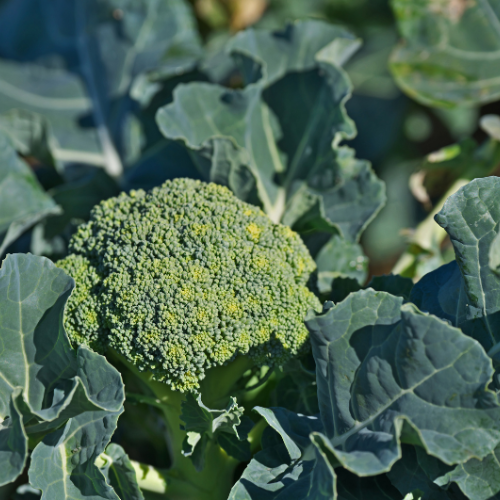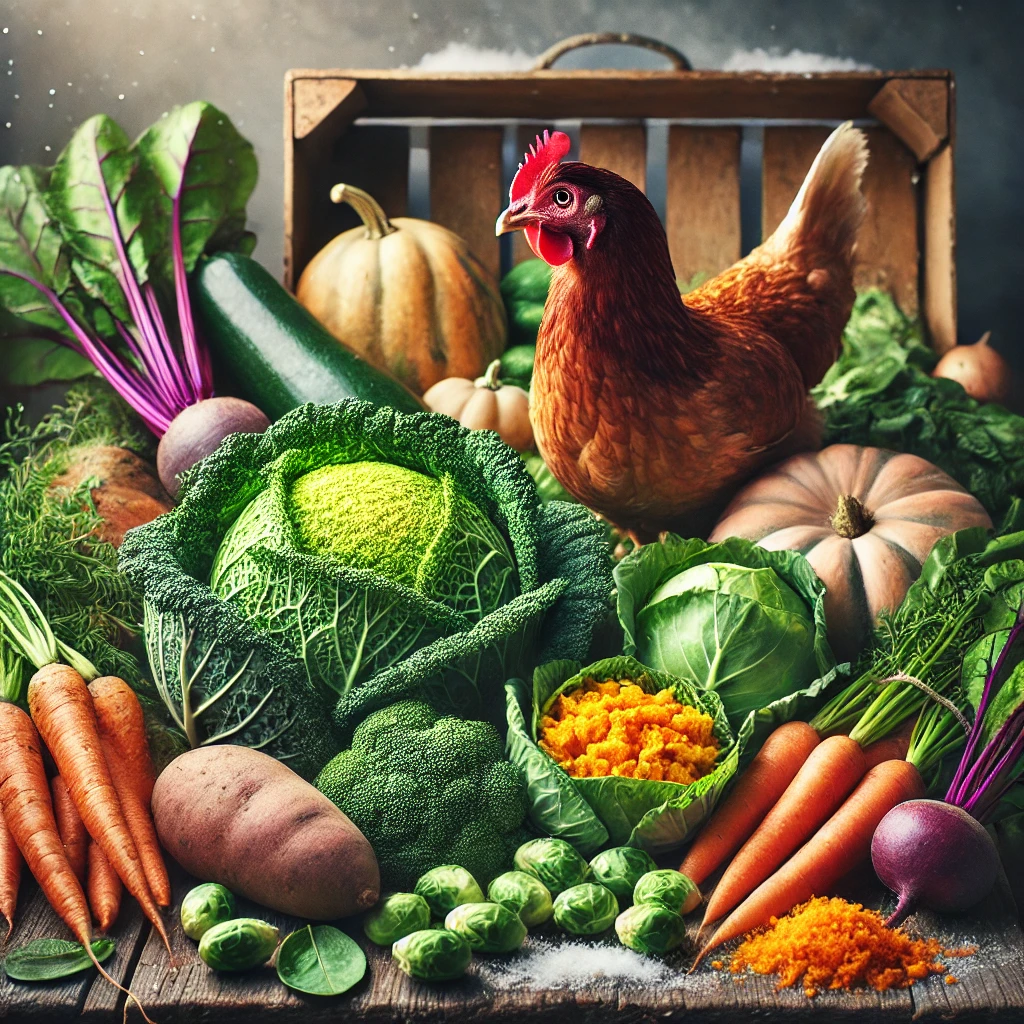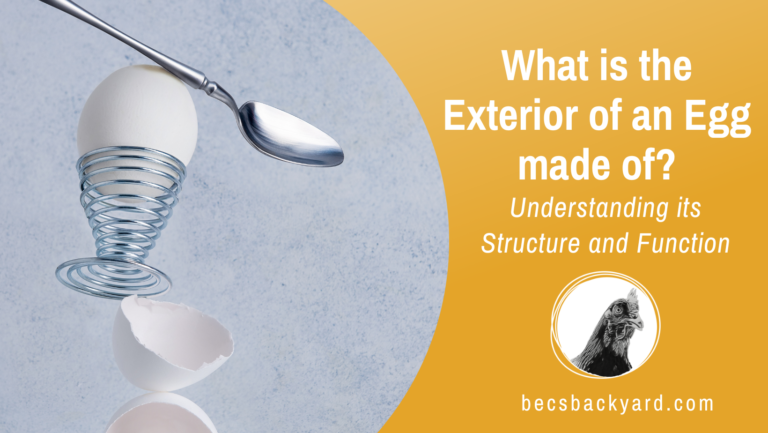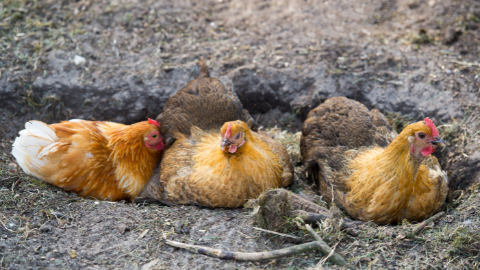Winter Plants for Chickens: My Top Picks to Keep Your Flock Healthy and Happy

Winter can be tough for us backyard chicken owners. With the cold temperatures and limited food sources, it sometimes feels like a real challenge to keep my feathered friends happy and healthy. But I’ve found that growing certain plants during the winter months can provide a fresh source of food and nutrition for my chickens, making this season a bit easier for everyone.
Some of My Favorite Winter Plants for Chickens
I’ve discovered that some of the best winter plants for chickens come from the brassica family, including cabbage, broccoli, and kale. These plants can be easily grown in pots or directly in the ground near your chicken coop. Not only do they thrive in colder weather, but they also offer a great source of fresh food for my birds, which they absolutely love.

Understanding My Chickens’ Winter Needs
As the temperatures start to drop, I make sure to focus on a few key areas to keep my chickens healthy and content during the winter months.
Food and Water
During the winter, my chickens need more food to maintain their body temperature and stay warm. I make sure to provide them with plenty of high-quality feed and often supplement their diet with scratch grains or other treats to help keep them cozy.
It’s also crucial to ensure they have access to clean, fresh water at all times. In the cold weather, the water can freeze over quickly, so I check and refill their waterer more frequently.
Shelter
A warm, dry place to roost at night is essential for chickens, especially during winter. I ensure their coop is well-insulated and free from drafts, with plenty of bedding to help them stay warm. Sometimes, I add a heat lamp or another source of supplemental heat to their coop, but I’m always careful to follow safety guidelines and monitor the temperature closely to avoid any potential fire hazards.
Exercise and Enrichment
Even when it’s cold, I make sure my chickens get plenty of exercise and mental stimulation. I’ve set up a covered outdoor area where they can scratch and peck, and I offer them toys and other enrichment activities to keep them entertained.
Health and Wellness
Throughout the winter, I keep a close eye on my chickens’ health. I watch for any signs of illness or injury and ensure they get any necessary veterinary care. By meeting these winter needs, I help my chickens stay healthy, happy, and productive all season long.
My Ideal Winter Plants for Chickens
Planting winter crops has been a great way to provide my chickens with fresh and nutritious food during the colder months. Here are some of my top picks:
Greens
Greens are a fantastic source of vitamins and minerals for chickens. Here are some that I like to plant during the winter months:
- Kale: Rich in vitamins A, C, and K, plus calcium, iron, and antioxidants.
- Spinach: Packed with vitamins A, C, and K, as well as iron, calcium, and antioxidants.
- Swiss chard: A great source of vitamins A, C, and K, along with magnesium, potassium, and iron.
- Collard greens: Another excellent option, loaded with vitamins A, C, and K, plus calcium, iron, and antioxidants.

Grains
Grains are a good source of carbohydrates and protein for chickens. Here are some that work well during the winter:
- Wheat
- Oats
- Rye
- Barley
However, it’s important to note that not all plants are safe for chickens. I always do my research before planting anything near the coop. Also, since chickens might not forage as much during winter, I make sure to provide them with enough food and water.
Benefits of Winter Plants for Chickens
Winter can be a challenging time for chickens, as food sources become scarce, and the cold weather can take a toll on their health. However, I’ve found that planting winter plants in or around the coop can provide numerous benefits.
Nutritional Benefits
Winter plants offer a valuable source of nutrition for my chickens during the colder months. For example:
- Kale: This leafy green is packed with vitamins A, C, and K, and calcium, helping to keep my chickens healthy.
- Cabbage: Another leafy green that’s high in vitamins and minerals, and also a good source of fiber. My chickens enjoy pecking at the leaves, which keeps them entertained.
- Carrots: These root vegetables are high in beta-carotene, which can improve the immune system of chickens. They also provide a crunchy texture that my birds enjoy.
Behavioral Benefits
Winter plants also offer behavioral benefits for my chickens:
- Entertainment: During winter, when my chickens are cooped up inside more often, they can get bored. Planting winter plants in their coop or run gives them something to peck at and explore, which helps keep them entertained.
- Stress relief: Winter can be stressful for chickens due to the lack of sunlight and cold temperatures. By planting winter plants, I provide them with a calming and relaxing environment, which helps reduce their stress levels.
- Natural dewormer: Some winter plants, like nasturtiums, can act as a natural dewormer for chickens. The leaves and seeds contain a compound that helps expel intestinal worms from chickens.
Overall, by growing winter plants for chickens in their chicken coop or run, I can provide a range of benefits for my flock. By giving them a source of nutrition and entertainment, while also reducing their stress levels, I help keep my chickens healthy and happy during the colder months.
How I Grow Winter Plants for Chickens
If you’re looking to provide your chickens with fresh greens during the winter months, growing winter plants is a great option. Here’s how I do it:
Indoor Growing
Growing winter plants indoors can be a great option if you don’t have much outdoor space or live in an area with harsh winters. Here’s what I’ve learned:
- Choose a sunny spot: Winter plants need a lot of light to grow, so I pick a spot in my home that gets plenty of sunlight.
- Use grow lights: If you don’t have a sunny spot, grow lights can provide the necessary light for plant growth.
- Choose the right plants: Some great winter plants for indoor growing include wheatgrass, kale, and spinach. I also like to grow herbs like parsley, cilantro, and thyme.
- Use the right soil: I use high-quality potting soil and ensure my pots have good drainage.
Outdoor Growing
If you have outdoor space, you can also grow winter plants outside. Here’s what works for me:
- Choose the right plants: Great options for outdoor growing include kale, collard greens, and Swiss chard. I also grow herbs like rosemary, sage, and oregano.
- Use the right soil: I make sure my soil is well-draining and has plenty of organic matter.
- Protect your plants: Winter plants can be sensitive to frost and cold temperatures, so I protect them with row covers or cloths when necessary.
- Water regularly: Even though it’s cold outside, plants still need water. I water them regularly but take care not to overwater.
Growing winter plants for chickens is a great way to provide fresh greens during the colder months. With the right care and attention, you can grow healthy and nutritious plants that your chickens will love.
Potential Challenges and How I Handle Them
Harsh Weather Conditions
Winter weather can be tough on chickens and their environment. Cold temperatures, snow, and ice can make it difficult to keep chickens healthy and comfortable. One common issue is frostbite, which can affect chickens’ combs, wattles, and feet. To prevent frostbite, I make sure the coop is dry, well-ventilated, and draft-free. Chickens also need a warm and dry place to roost at night, so I consider adding insulation or a heat lamp if necessary.
Another challenge is keeping the water supply from freezing. Chickens need access to fresh water at all times, so I use a heated waterer or change the water frequently to prevent it from freezing. Additionally, chickens may need extra feed during the winter months to maintain their body heat and energy levels.
Pest Control
Pests like mites, lice, and rodents can be a problem during the winter months. These pests can cause discomfort and health issues for chickens and can also damage the coop and feed storage areas. To prevent pest infestations, I keep the coop clean and dry and regularly inspect and treat the chickens and their environment for pests.
One effective method of pest control I use is a preventative measure keeping the coop as dry and clean as possible, for this I use builders mix sand which allows me to sieve out any droppings and moisture drains away. Additionally, sealing up any cracks or holes in the coop can prevent rodents from entering and causing damage. Regularly removing and disposing of any spilled feed can also help prevent pest infestations.
Conclusion
In conclusion, providing winter plants for chickens is an excellent way to ensure that my flock stays healthy and happy throughout the colder months. By offering a variety of nutritious and tasty greens, I can supplement their diet and provide them with the vitamins and minerals they need to thrive.
Remember, a happy and healthy flock means more eggs, better meat, and a more enjoyable experience as a chicken keeper.







